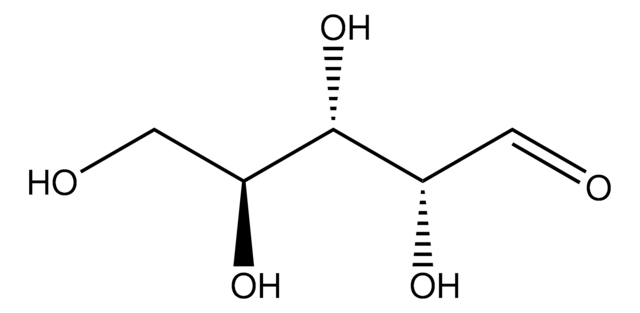M8574
D-(+)-Mannose
synthetic, ≥99% (GC)
Synonyme(s) :
D-Mannopyranose
About This Item
Produits recommandés
Source biologique
synthetic
Essai
≥99% (GC)
Forme
powder
Activité optique
[α]25/D 13.5 to 14.9 °, c = 4% (w/v) in water
Technique(s)
gas chromatography (GC): suitable
Couleur
white to off-white
Pf
133-140 °C (lit.)
Solubilité
water: soluble 10 g/L at 20 °C
Température de stockage
room temp
Chaîne SMILES
OC[C@H]1OC(O)[C@@H](O)[C@@H](O)[C@@H]1O
InChI
1S/C6H12O6/c7-1-2-3(8)4(9)5(10)6(11)12-2/h2-11H,1H2/t2-,3-,4+,5+,6?/m1/s1
Clé InChI
WQZGKKKJIJFFOK-QTVWNMPRSA-N
Vous recherchez des produits similaires ? Visite Guide de comparaison des produits
Application
Actions biochimiques/physiologiques
Autres remarques
Code de la classe de stockage
11 - Combustible Solids
Classe de danger pour l'eau (WGK)
WGK 1
Point d'éclair (°F)
Not applicable
Point d'éclair (°C)
Not applicable
Faites votre choix parmi les versions les plus récentes :
Certificats d'analyse (COA)
Vous ne trouvez pas la bonne version ?
Si vous avez besoin d'une version particulière, vous pouvez rechercher un certificat spécifique par le numéro de lot.
Déjà en possession de ce produit ?
Retrouvez la documentation relative aux produits que vous avez récemment achetés dans la Bibliothèque de documents.
Les clients ont également consulté
Notre équipe de scientifiques dispose d'une expérience dans tous les secteurs de la recherche, notamment en sciences de la vie, science des matériaux, synthèse chimique, chromatographie, analyse et dans de nombreux autres domaines..
Contacter notre Service technique








